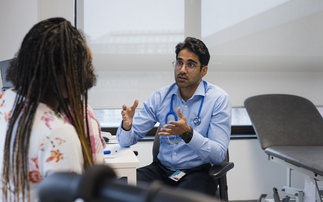Should expensive drugs be offered free of charge - either on the NHS or by private medical insurers? Johanna Gornitzki takes a closer look at the Herceptin debate
In 2005, Health Secretary Patricia Hewitt said no patient diagnosed with early stage breast cancer should be denied access to Herceptin on the grounds of cost.
This caused lobbyists throughout the UK to breath a sigh of relief, thinking the battle had been won.
But this was not the case - as cancer sufferer Ann Marie Rogers found out in February this year when she lost her legal case to receive Herceptin on the NHS.
Her situation reignited the debate over whether all patients diagnosed with early stage breast cancer should have the right to receive the drug for free. However, with thousands of drugs denied to patients every day, why did this one create such a stir?
Immune system
Herceptin, or to use its generic non-branded name, Trastuzumab, works by stopping one of the ways in which breast cancer cells divide and grow. Some breast cancers have higher than normal levels of a protein, HER2, on the surface of the cancer cells. This helps the cancer cells to grow.
The drug works by sticking to the HER2 proteins so the cancer cells are no longer stimulated to grow. It also helps the body's immune system destroy breast cancer cells.
While around 41,700 people are diagnosed with breast cancer each year in the UK, only patients whose cancer has high levels of the HER2 protein will benefit from taking Herceptin.
This is known as HER2 positive breast cancer and it is found in about 20% to 25% of breast cancer patients.
Until now, Herceptin has mainly been given to patients with secondary breast cancer following recommendations made by the National Institute of Clinical Excellence (Nice) in 2002, suggesting it should only be available for women with HER2 positive advanced breast cancer. According to Nice, early stage breast cancer was not included in the 2002 recommendations as there was not enough evidence showing how the drug would affect those patients.
"At the time the drug was licensed for advanced breast cancer there was not enough data for early stage breast cancer," says Lucy Betterton, associate director for communication at Nice.
Betterton also points out that most people suffering from advanced breast cancer are prescribed the drug to prolong their lives while patients with early stage breast cancer would be given the drug as a way to combat the disease.
Risk factors
This makes the risk factor very different. "The risk that you take if you are dying is very different from the risk that you take if you are surviving - and this is something we had to take into account," she explains.
That said, the true obstacle to offering the drug comes down to one thing - cost.
Herceptin is a very expensive drug and a year's treatment sets the NHS back £21,184.
Some commentators suggest the cost could end up being double that.
With around 10,000 cases of HER2 positive breast cancer diagnosed each year, that could mean a cost of £40m to the NHS - a sum of money the public health sector simply would not be able to provide without tightening its belt somewhere else.
As well as the huge burden this would impose on the NHS, there are also opposing views on how effective the drug actually is. According to cancer charity Breast Cancer Care, four large studies involving more than 12,000 patients have provided consistent evidence of the drug's effectiveness for early stage HER2 positive breast cancer by cutting the risk of cancer recurrence by half. However, Dr Karol Sikora, professor of cancer medicine and honorary consultant oncologist of Imperial College School of Medicine at Hammersmith Hospital, hits back at these findings.
He says: "That's not true; they are simply playing with statistics". Instead, he argues that prescribing the drug would lead to a 6.2% reduction at the end of a year. That means 18 women need to take the drug for one single woman to benefit from it.
"While it certainly is a significant figure, it is not a massive one," Dr Sikora says. Nice admits there are no conclusive statistics, and says the findings are still "very provisional".
• evertheless, despite the obvious lack of funding and conclusive facts, Herceptin is still likely to become available on the NHS. The people lobbying for it believe this has to happen, claiming Herceptin is a miracle drug that can save lives.
Medical experts, however, argue the claims about the drug's wonder effects are exaggerated and that it will simply be licensed because breast cancer is a sensitive matter that politicians cannot afford to ignore.
"They are going to have to approve it no matter what. Where the Primary Care Trusts are going to get the money from is another matter. I suppose they will have to take it from somewhere else, like elderly care, for example," says Dr Sikora.
And no matter where the truth lies, the approval of Herceptin for patients with early stage breast cancer is currently being fast-tracked after Roche, the maker of the drug, submitted an application to Nice for the use of the drug to treat patients in the early stages of the disease.
• ice guidance
The speed of this review will depend on whether a licence is granted by the European Medicines Evaluation Agency (EMEA). If a licence is granted, the drug will be available for use throughout the EU, with guidance issued by Nice soon afterwards. Roche expects a decision from the EMEA by July at the earliest and Nice says it will be publishing its guidelines in August this year.
Until then, however, Herceptin will continue to be given to some patients while others are turned down.
Breast Cancer Care spokeswoman Sophie Howell is horrified by this haphazard way of dealing with this issue.
She says: "Treatment decisions should be based on clinical decisions alone, not on financial or geographical considerations. Patients with early stage breast cancer who have been told they may benefit, provided they are aware of the potential risks involved with taking an unlicensed drug, should be able to access it.
"We want the Department of Health to give clear direction to Primary Care Trusts over access to Herceptin as a matter of urgency and stop the postcode lottery that is causing so much anxiety and frustration while we await a licensing decision."
While the NHS currently offers Herceptin to patients with early breast cancer on an ad hoc basis, there is a widely held assumption that private medical insurance (PMI) customers would fare slightly better. But is that so?
It seems the major PMI providers can be divided into three camps - one providing the treatment to all of its customers, another providing it on a case-by-case basis and a third not offering it all to customers diagnosed with early stage breast cancer.
BUPA, PruHealth, Norwich Union Healthcare and WPA all decided to fund the drug following results from three major trials that reported interim results at the American Society of Clinical Oncology in May 2005. These showed that Herceptin could reduce the risk of the cancer recurring in early stage breast cancer.
Case-by-case
Moreover, Standard Life Healthcare, BCWA and Groupama are providing the drug to early stage breast cancer patients on a case-by-case basis, where they deem it medically justified. Legal & General and AXA PPP healthcare, however, are currently not offering it.
The division seems to lie in the way the drug is perceived. Some companies, for example, class it as an active treatment.
"Norwich Union Healthcare took a view very early on that the evidence for the treatment in this setting was so strong that we would allow our customers access to it. Our view is that it is clearly a treatment of an acute illness and it falls within the definitions of what we cover our customers for under our policies," says Steve Moody, claims management manager at Norwich Union Healthcare.
However, other providers see it as preventative treatment. Ben Faulkner, press officer at AXA PPP healthcare, explains: "Our policies do not pay for treatment that is preventative - that is, treatment that is given to stop or delay something happening in the future.
"In early breast cancer, Herceptin is given to decrease the risk of recurrences and /or progression to metastatic disease. In these circumstances Herceptin treatment comes within our exclusion for preventative treatment."
While offering Herceptin could only be good for the PMI industry in terms of showing customers that it is not just a luxury, industry experts warn of the double-edged sword effect.
"The cost of these new drugs is high and there is a risk that, unchecked, they could make PMI unaffordable. Indeed, there is a worry among those treating cancer that there will not be enough money from whatever source to meet demand and cost," says Chris Dark, PruHealth's clinical director.
This problem should not be ignored and, although it is understandable that customers would like insurance to cover the cost of Herceptin for early stage breast cancer, insurers need to keep in mind that payment for Herceptin and other expensive treatments would effectively inflate future premium costs for all policyholders, making healthcare cover less accessible to a wider audience.
Saving lives or not, the fact is that Herceptin is significantly more expensive than Tamoxifen, the previous gold standard drug used for breast cancer.
It is also appropriate for fewer patients. This has created significant funding issues for PMI providers and the NHS.
With several other cancer drugs carrying similarly hefty price tags about to come onto the market, this is only the tip of the iceberg.
This dilemma is unlikely to go away and, while it can be argued that life is priceless, one way or another someone will have to pay.
Case study: How Herceptin helped beat cancer
In January 2005, Fahmina Yusuf found a lump in her breast. She visited her GP and two days later was told she had breast cancer.
Luckily, Fahmina, 41, who worked as a PA before returning to university to study law in 2003, had private medical insurance with BUPA. A week after she was diagnosed she underwent surgery.
Following the removal of the affected tissue, she had a four-month course of chemotherapy and in August last year she was offered Herceptin by BUPA.
At the end of February 2006, she was given the all-clear.
Fahmina says: "When I was first diagnosed, BUPA was not funding Herceptin for early stage breast cancer.
"My doctor told me about Herceptin and even though he mentioned the massive cost, I was considering paying for it myself.
"It came as a great relief, however, when BUPA called me a few weeks later and said they had decided to fund the drug.
"Soon after that I started my treatment," she says.
Today, Fahmina says she is feeling just as healthy as she did before the cancer.
And she thanks her lucky stars for her medical cover.
"After what I have been through, I can't stress enough the importance of PMI - I guess it goes without saying," she adds.
Fahmina had returned from travelling in South America when she was diagnosed - and now hopes to travel again.











